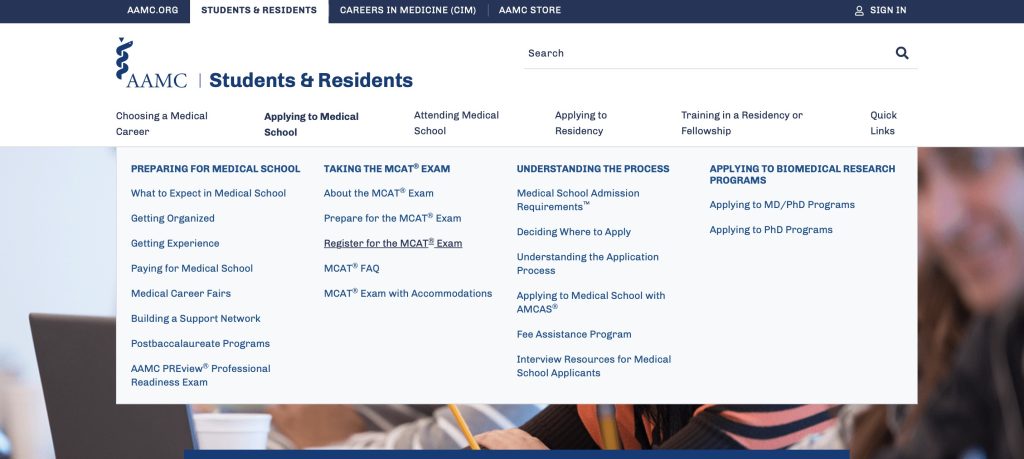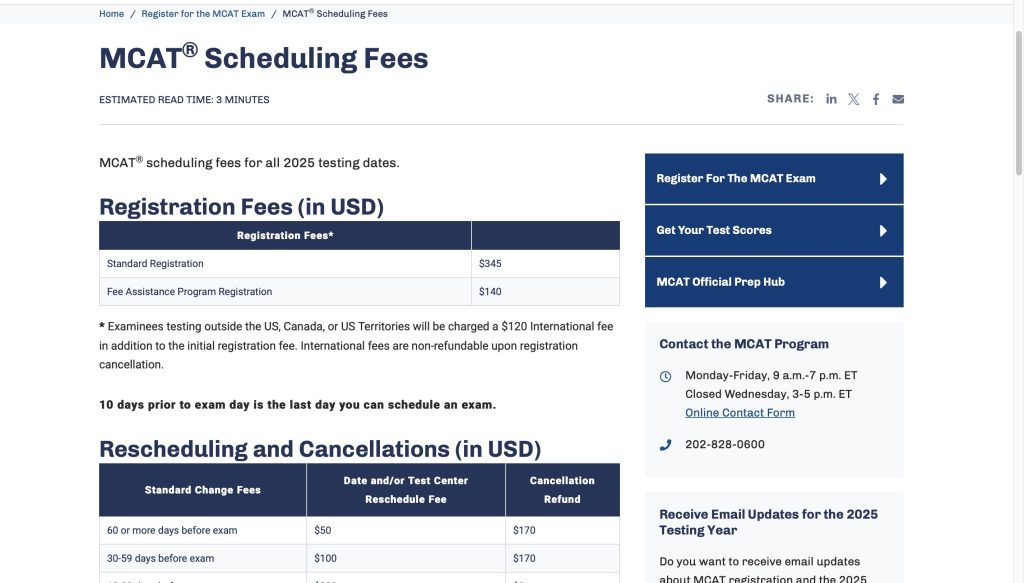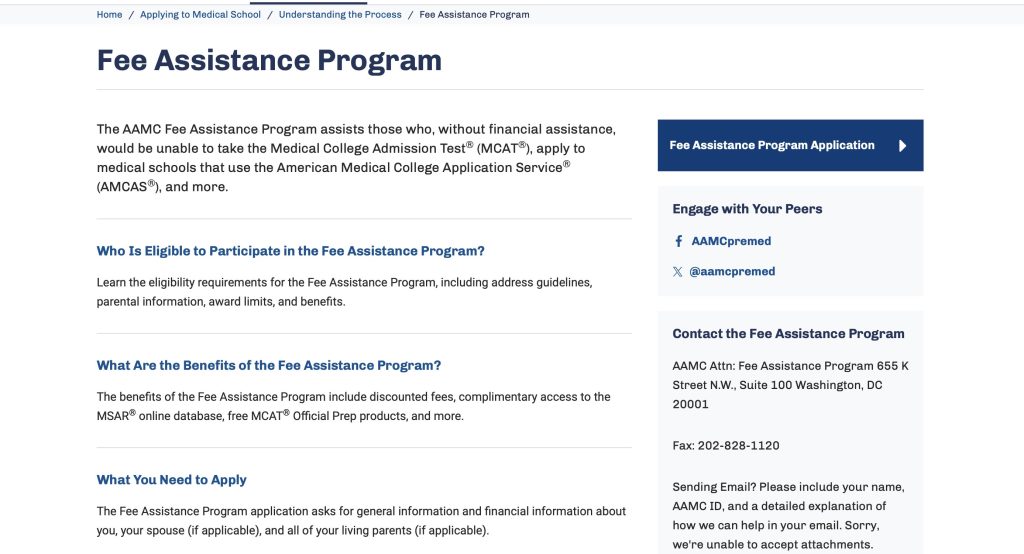Essential Information and Expert Tips for Effective MCAT Test Prep 2024-2025
The MCAT is one of the biggest milestones on your journey to becoming a doctor, and let’s be honest—it can feel overwhelming. Trust me, I’ve been there—feeling stressed by the mountain of study materials, wondering if you’ll ever be ready and feeling the pressure of your future hanging in the balance. But it doesn’t have to be that way.
By understanding the MCAT and its impact on your path to becoming a doctor, you can start to ease that pressure and approach the exam with more confidence.
Whether you’re feeling unsure about where to start or you just need a bit of extra motivation, I’ve got you covered. So, get comfortable! I’m here to guide you through everything you need to know about the MCAT to make informed, strategic decisions about your preparation. We’ll cover the key aspects of the test, from the topics it covers to how it’s scored, helping you turn what once felt like an obstacle into an opportunity. Keep reading for expert tips, strategies, and the motivation we all need at this stage of the journey!
What is the MCAT?
The MCAT, or Medical College Admission Test, is a standardized, multiple-choice exam developed by the AAMC (Association of American Medical Colleges). This essential assessment evaluates your critical thinking, problem-solving abilities, and understanding of key concepts across natural, behavioral, and social sciences.
Why is the MCAT Important for Medical School?
The MCAT is a vital part of your medical school application, whether you’re applying to an MD or DO program. Medical schools often use MCAT scores as an objective measure to predict applicants’ success in medical education and to compare students across diverse backgrounds.
However, it’s important to note that not all schools rely solely on the MCAT for admissions decisions. Many institutions take a more holistic approach, considering a variety of factors such as academic performance, personal characteristics, letters of recommendation, and extracurricular activities. This allows schools to evaluate each applicant comprehensively, beyond just test scores.

What Topics are Included in the MCAT?
The MCAT is a comprehensive exam that covers a wide array of topics essential for success in medical school. The test evaluates skills in reading comprehension and assesses knowledge in key areas of the natural and social sciences.
Specifically, the MCAT focuses heavily on foundational concepts in:
- Biology
- Chemistry
- Biochemistry
- Physics
- Psychology
- Sociology
This diverse range of subjects ensures that students are well-prepared for the challenges of medical education and can apply their knowledge effectively in real-world scenarios.
What is the Structure of the MCAT?
The MCAT consists of four main sections, each designed to assess different competencies essential for medical education. Each section includes various questions and passages that must be completed within specific time limits:
- Chemical and Physical Foundations of Biological Systems (CP)
- Number of Questions: 59
- Time Limit: 95 minutes
- Format: 10 passages and 15 stand-alone questions
- Focus Areas: Inorganic and organic chemistry, physics, mathematics, and biochemistry. This section tests your ability to interpret passage information, analyze data, and understand graphs and tables.
- Critical Analysis and Reasoning Skills (CARs)
- Number of Questions: 53
- Time Limit: 90 minutes
- Format: 9 passages with no stand-alone questions
- Focus Areas: This section does not center on specific content areas but presents passages related to the humanities, arts, and social sciences. It is often considered the most challenging section, as it evaluates your critical thinking and reasoning skills. Success in CARs requires extensive practice.
- Biological and Biochemical Foundations of Living Systems (BB)
- Number of Questions: 59
- Time Limit: 95 minutes
- Format: 10 passages and 15 stand-alone questions
- Focus Areas: This section covers concepts in biology, biochemistry, statistics, and organic chemistry. Like the CP section, it tests your ability to comprehend passage information, analyze data, and interpret graphs and tables.
- Psychological, Social, and Biological Foundations of Behavior (PsS)
- Number of Questions: 59
- Time Limit: 95 minutes
- Format: 10 passages and 15 stand-alone questions
- Focus Areas: This section focuses on biology, psychology, and sociology. It tests your ability to understand passage information and analyze data, while also requiring knowledge of various social concepts that you should have memorized.
Understanding the structure of the MCAT is essential for effective preparation, helping you allocate your study time effectively across all sections.
How is the MCAT Scored?
The MCAT scoring system is unique compared to traditional testing methods, such as pass/fail or curved scoring. MCAT scores range from a low of 472 to a high of 528, with each of the four sections scoring between 118 (lowest) and 132(highest).
Each section is scored separately, and the total score is the sum of these individual section scores. There is no set “passing” score; however, many medical schools have a minimum MCAT requirement for applications, making it crucial to aim for a competitive score.
Here are some key points about the scoring system:
- No Penalties for Wrong Answers: The MCAT does not penalize you for incorrect answers, meaning wrong responses do not subtract points from your score. This means you should always attempt to answer every question, even if you’re unsure.
- Beta Questions: Some questions on the exam are labeled as “Beta Questions,” which are being tested for potential inclusion in future versions of the MCAT. These questions do not count toward your score, even if answered correctly, and you won’t know which ones they are.
- Percentile Ranking: Your score is converted by the AAMC into a percentile rank. For example, a score of 501 or above typically places you in the 50th percentile, indicating that you performed better than half of the test-takers.
- Score Release: The scoring process takes about 30 days, and you can find your results in your AAMC account.
- Non-Scoring Option: If you decide not to have your exam scored at the end of your test date, you can opt out. However, the attempt will still count toward your lifetime limit of seven attempts.
Understanding the MCAT scoring system is essential for effective preparation and strategic test-taking. Aim for the highest score possible to enhance your competitiveness in the medical school admissions process.

How Can I Register for the MCAT?
Registering for the MCAT involves a few essential steps. Follow this guide to ensure a smooth registration process:
- Create an AAMC Account: Begin by creating an account on the AAMC (Association of American Medical Colleges) website. Navigate to the “MCAT Registration” section.
- Enter Accurate Demographics: When filling out your demographic information, ensure that it matches exactly with the details on your ID. This is crucial for successful registration.
- Score Release Options: You will have the option to allow the AAMC to release your MCAT scores to institutions other than medical schools. Review this option carefully.
- Review MCAT Essentials: Before finalizing your registration, take time to review the MCAT Essentials provided by the AAMC. This document contains important information about the exam.
- Understand Testing Limits: Keep in mind that you have a maximum of seven attempts to take the MCAT throughout your lifetime, with a limit of two attempts per year.
- Check Exam Availability: The MCAT is offered during specific times of the year, typically 2 to 6 times per month over an eight-month period. Given the limited availability, it’s essential to register as early as possible to secure your preferred date and location.
By following these steps and registering promptly, you can maximize your chances of obtaining a suitable test date and location for the MCAT.


How Can I Pay for the MCAT?
Understanding the costs associated with the MCAT is essential for effective planning. Here’s a breakdown of the fees for standard students and those in the Fee Assistance Program:
For Standard Students:
- MCAT Exam Fee: $345 per attempt.
Rescheduling Fees:
- 60 Days Prior: $50
- 30-59 Days Prior: $100
- 10-29 Days Prior: $200
- Less than 10 Days Prior: No rescheduling allowed; the attempt will still count towards your lifetime limit, even if you do not show up.
Cancellation Refunds:
- 60 Days Prior: $170
- 30-59 Days Prior: $170
- 10-29 Days Prior: $0
- Less than 10 Days Prior: No cancellation allowed; the attempt will still count towards your lifetime limit, even if you do not show up.
For Students in the Fee Assistance Program:
- MCAT Exam Fee: $140 per attempt.
Rescheduling Fees:
- 60 Days Prior: $20
- 30-59 Days Prior: $40
- 10-29 Days Prior: $80
- Less than 10 Days Prior: No rescheduling allowed; the attempt will still count towards your lifetime limit, even if you do not show up.
Cancellation Refunds:
- 60 Days Prior: $70
- 30-59 Days Prior: $70
- 10-29 Days Prior: $0
- Less than 10 Days Prior: No cancellation allowed; the attempt will still count towards your lifetime limit, even if you do not show up.
Make sure to account for these fees in your budgeting to ensure a smooth registration process for the MCAT


How Should I Study for the MCAT?
Preparing effectively for the MCAT requires a strategic approach. Here are some essential tips to help you succeed:
- Start Preparing Early: The MCAT covers a broad range of topics, many of which you may not have studied in some time. Starting early gives you ample time to review and master the material.
- Take a Diagnostic Test: Begin your preparation with a diagnostic test to assess your current knowledge and identify areas that need the most attention. This will help you focus your study efforts more effectively.
- Develop a Study Plan: Create a personalized study plan that accommodates your individual needs and schedule. This plan should outline your study goals, materials, and a timeline to keep you on track.
- Utilize Free Resources: Take advantage of the many free resources available online, including practice questions, study guides, and video tutorials. These can complement your study materials and provide additional support.
- Enroll in a Prep Course like Ruah, Prep Like a Pro:
- Expert Guidance: Our instructors have extensive experience with the MCAT and understand the intricacies of the exam. They provide valuable insights into effective strategies and key content areas.
- Comprehensive Resources: Ruah offers a wealth of study materials, including detailed practice questions, full-length exams, and interactive lessons tailored to the MCAT format.
- Structured Accountability: Joining our prep course keeps you accountable with regular check-ins and progress assessments, ensuring you stay on track with your study goals.
- Community Support: Connect with fellow students who are also preparing for the MCAT. Our collaborative environment fosters motivation and encourages shared learning experiences.
- Focused Learning: Our curriculum is designed to target challenging subjects and common pitfalls, providing detailed explanations and strategies to tackle complex topics effectively.
By enrolling in Ruah, Prep Like a Pro, you gain access to a supportive learning environment and the resources necessary to elevate your MCAT preparation. These advantages can significantly enhance your chances of achieving a competitive score and successfully gaining admission to medical school.
